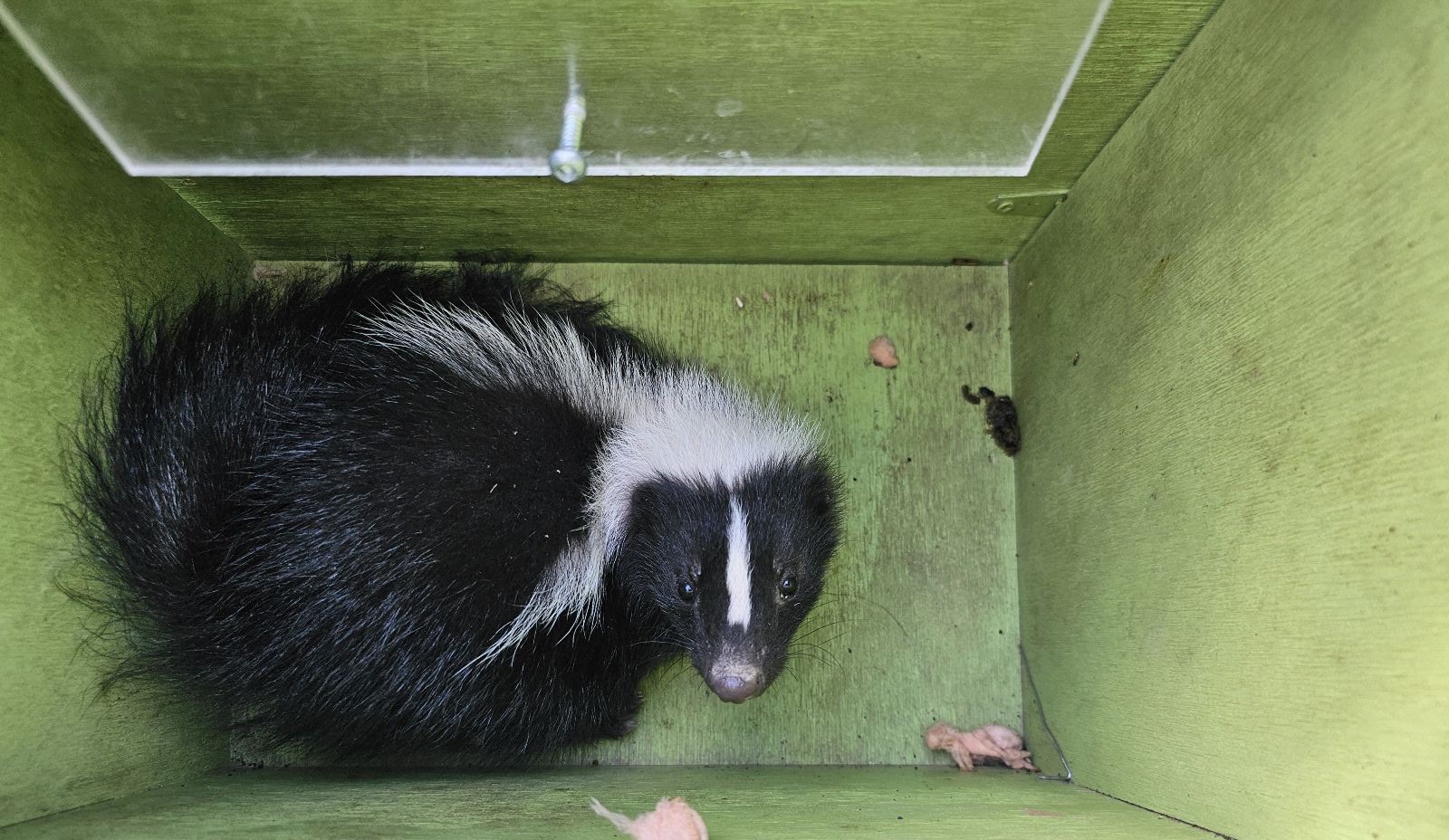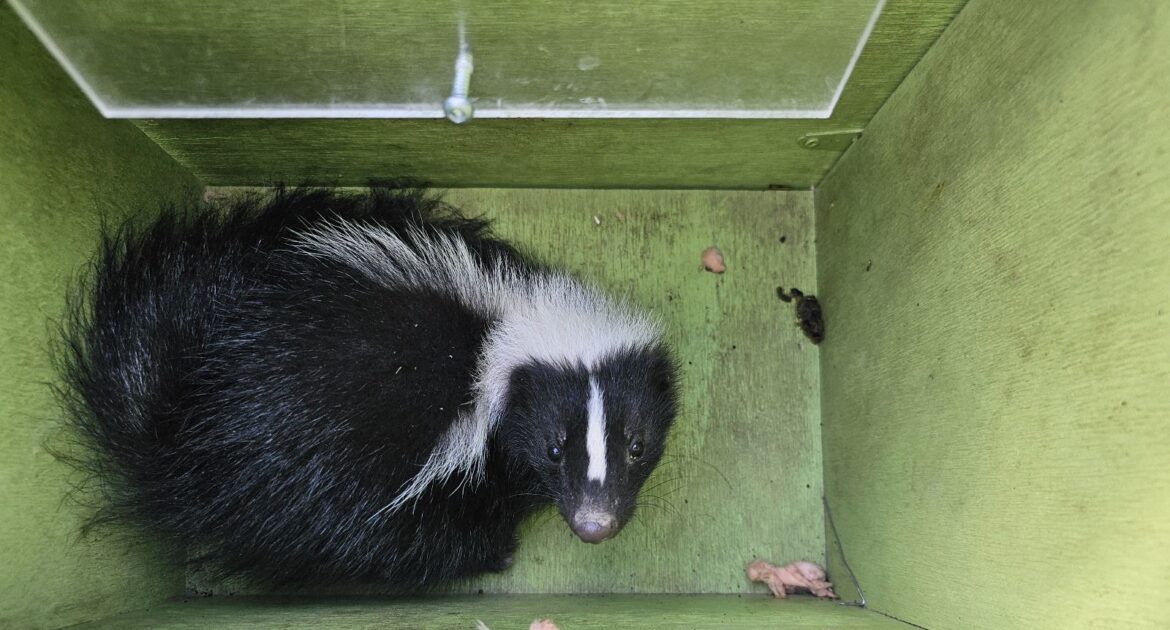As the seasons shift, so too do the habits and behaviours of various wildlife, including the elusive skunk. These fascinating creatures have developed unique adaptations to navigate the challenges presented by changing weather patterns and food availability. By examining their seasonal behaviours, we gain insight into their survival strategies, enabling us to foster a better understanding of their role in our ecosystem, particularly in urban areas like Montreal.
Understanding how skunks communicate through vocalizations and body language is critical to managing wildlife in Montreal. Skunks exhibit a range of sounds—such as hisses, growls, and purrs—that convey their feelings, whether it be fear, aggression, or contentment. Additionally, their body posture can indicate their mood, allowing us to interpret their actions more accurately.
At Skedaddle Humane Wildlife Control, we recognize the importance of these communication strategies not just for the skunks themselves but for ensuring harmonious coexistence between humans and wildlife. As we delve deeper into the seasonal behaviours of skunks, we will explore the adaptations that allow them to thrive in Montreal’s diverse environments, providing invaluable insights for both wildlife enthusiasts and successful management practices.
Overview of Skunk Behavior
Skunks are known for their distinctive black-and-white coloration and their ability to spray a foul-smelling liquid as a defence mechanism. These nocturnal animals have a keen sense of smell and hearing, which they use to locate food and avoid predators. Skunks are omnivores, feeding on a diverse diet that includes insects, small mammals, fruits, and plants.
Skunks typically live in wooded areas, grasslands, and suburban neighbourhoods. They often make their dens in burrows, hollow logs, or underneath buildings. These animals are solitary by nature, only coming together during the breeding season. Understanding their habitat and lifestyle is crucial for effective urban wildlife control, as it helps anticipate and mitigate potential conflicts with humans.
For homeowners, knowing about skunk behaviour can be immensely helpful. Preventing these animals from settling too close to human dwellings is essential to avoid damage and unpleasant encounters. Professional wildlife control services, like those offered by Skedaddle Humane Wildlife Control, are vital in managing these situations humanely and effectively.
Fall Preparation for Winter
During the fall, skunks begin preparing for the colder months ahead. One key preparation is food storage. They increase their foraging activities to build up fat reserves necessary for winter survival. Skunks also focus on finding suitable shelter, often seeking out secure, insulated locations to create their dens. These shelters provide protection against the harsh weather and potential predators.
Another critical adaptation in fall is fat accumulation. By consuming more calories, skunks build up their fat reserves, which help them maintain energy levels during periods of limited food availability. Alongside fat accumulation, skunks engage in limited activity to conserve energy. This behaviour helps them survive when food is scarce and conditions are harsh.
Skunks also enhance their burrows to prepare for winter. They dig deeper and line their dens with leaves and grass to insulate against the cold. These adaptations ensure that skunks can endure the winter months with minimal activity, relying on their fat reserves and well-insulated dens for survival.
Winter Survival Tactics
While skunks do not undergo true hibernation, they enter a state of torpor during winter. This period of reduced activity allows them to conserve energy and survive on their stored fat. Skunks will occasionally venture out during warmer spells to forage for food, but their overall activity remains minimal.
During winter, skunks may seek shelter in human-occupied spaces, such as under decks, sheds, or basements. Professional wildlife control is crucial during these months to prevent these animals from invading homes. Services like those provided by Skedaddle Humane Wildlife Control ensure that skunks are humanely excluded from properties without causing harm to the animals or residents.
Spring Mating and New Beginnings
With the arrival of spring, skunks become more active as they emerge from their winter torpor. This season marks the beginning of the breeding season, with males and females coming together to mate. During this time, skunks establish and defend territories, making it essential for homeowners to be vigilant.
Spring also brings an increase in skunk sightings as they become more active and visible. Our team at Skedaddle Humane Wildlife Control is well-equipped to handle these situations, providing humane and effective solutions to prevent skunks from settling too close to human dwellings. By addressing potential issues early, we help ensure a peaceful coexistence between skunks and homeowners.
Summer Feeding and Exploration
During the summer months, skunks take advantage of the abundance of food sources available. They forage extensively, feeding on insects, small mammals, fruits, and plants. This period of increased activity and exploration allows them to replenish their energy reserves and prepare for the next seasonal cycle.
Summer can also bring challenges for human-skunk interactions in urban settings. Skunks may venture closer to homes in search of food, leading to potential conflicts. It’s important for homeowners to secure garbage bins, remove pet food, and eliminate other attractants to minimize these interactions.
Professional wildlife control services play a crucial role in managing skunk populations during the summer. Our team at Skedaddle Humane Wildlife Control uses humane methods, such as one-way doors, to manage skunk populations and prevent them from becoming a nuisance to homeowners. These methods ensure the animals’ well-being while protecting human properties.
The Dangers of DIY Skunk Control
Attempting to manage wildlife on your own, particularly during the changing seasons, can lead to a range of risks and legal complications. While the intention may be to resolve issues quickly, understanding the potential dangers is crucial for promoting both the safety and humane treatment of animals. Professional intervention from experienced services like ours not only offers a safer solution but ensures effective and humane practices.
- Legal Issues: Many regions have specific laws regarding the management of wildlife. Failing to adhere to these regulations can lead to fines or legal repercussions.
- Health Risks: Skunks can carry diseases such as rabies or parasites like ticks and fleas. Direct contact or improper handling can expose individuals and pets to these health hazards, risking illness.
- Injury Potential: Attempting to capture or remove skunks without proper training can result in serious injuries. Skunks have strong claws and teeth, and if they feel threatened, they may defend themselves aggressively.
- Escalating Conflicts: DIY removal efforts may inadvertently cause more animals to enter your property as an escape from perceived threats. This could lead to more issues and conflicts rather than resolving the initial problem.
Our Humane Skunk Management Solutions
At Skedaddle Humane Wildlife Control, we are dedicated to providing effective and ethical solutions for managing wildlife populations. Our humane approach prioritizes both the safety of your property and the welfare of the animals. Here’s how we utilize one-way doors and other methods to ensure a sustainable coexistence with our furry neighbours during the changing seasons.
- One-Way Doors: This method allows skunks to leave your property while preventing their return. The doors are designed to ensure safe passage for the animals, enabling them to escape to a more suitable environment. This technique reduces stress for the animals and prevents further invasions in the future.
- Exclusion Techniques: We employ various exclusion strategies, such as sealing entry points and reinforcing openings with sturdy materials. By making it difficult for skunks to access shelters in, on, or around your home, we significantly decrease the chances of unwanted visits.
- Environmental Modifications: We advise homeowners on how to make their properties less attractive to wildlife. This includes keeping food sources secured, eliminating standing water, and maintaining gardens to minimize potential nesting sites.
By employing these humane strategies, we can effectively manage skunk populations while respecting their role in the ecosystem. Our commitment ensures that both homeowners and wildlife can thrive together harmoniously during all seasons.
Long-Term Animal Welfare and Legal Compliance
Our commitment to long-term animal welfare and legal compliance sets us apart. By using humane methods and adhering to legal guidelines, we ensure that skunks are managed responsibly. This approach benefits both the animals and homeowners, promoting a balanced coexistence.
Benefits of Professional Services
When it comes to managing wildlife interactions, enlisting the help of professional wildlife control services offers numerous advantages over DIY attempts. Our experienced team provides solutions that prioritize animal welfare, legal compliance, and long-term effectiveness. Here, we outline the key benefits of choosing professional assistance:
- Expertise and Knowledge: Our specialists possess in-depth knowledge of wildlife behaviour and ecology, allowing us to identify and address issues effectively. We understand the best practices to manage wildlife without causing undue stress to the animals, ensuring a more successful outcome.
- Legal Compliance: Navigating the legal landscape surrounding wildlife management can be complex. We ensure our methods comply with local wildlife regulations and protocols, thereby protecting homeowners from potential fines or legal repercussions.
- Humane Solutions: Our commitment to humane treatment means we employ strategies that promote the well-being of all animals involved. This ethical approach distinguishes our services, fostering a positive relationship between homeowners and local wildlife.
- Long-Term Effectiveness: Professional services focus not just on immediate remediation but on preventative measures to mitigate future conflicts. We assess potential risks and implement environmental modifications and exclusion techniques that keep wildlife at bay over time.
Preparing for the Fall and Winter Seasons
In summary, skunks exhibit remarkable adaptations throughout the seasons, from their energy conservation during the winter months to their increased activity in spring and summer as they forage and mate. The importance of professional wildlife management cannot be overstated, as it ensures safe and humane solutions for addressing potential skunk conflicts at each seasonal juncture.
As we approach the fall and winter, we encourage you to stay proactive. If you have skunk-related concerns as fall approaches, please consult with us at Skedaddle Humane Wildlife Control. Together, we can address these issues effectively and prepare for a peaceful coexistence during the colder months.
Contact us to request a quote and learn more about protecting your home from skunks!




